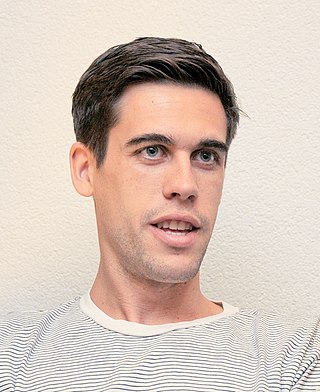Related Research Articles

Marie Louise Hartman, known professionally as Nina Hartley, is an American pornographic film actress and sex educator. By 2017 she had appeared in more than one thousand adult films. She has been described by Las Vegas Weekly as an "outspoken feminist" and "advocate for sexual freedom", and by CNBC as "a legend in the adult world".

Jeffrey Duncan Jones is an American actor, known for his roles as Emperor Joseph II in Amadeus (1984), Edward R. Rooney in Ferris Bueller's Day Off (1986), Charles Deetz in Beetlejuice (1988), Dr. Skip Tyler in The Hunt for Red October (1990), Eddie Barzoon in The Devil's Advocate (1997), and A.W. Merrick in both Deadwood (2004–2006) and Deadwood: The Movie (2019).

Timothy John Ryan is an American politician who served as a U.S. representative for Ohio from 2003 to 2023. A member of the Democratic Party, he represented Ohio's 13th congressional district from 2013 to 2023, having previously represented Ohio's 17th congressional district from 2003 to 2013. Ryan's district included a large swath of northeastern Ohio, from Youngstown to Akron. He was the Democratic nominee in the 2022 United States Senate election in Ohio, which he lost to JD Vance.
Incivility is a general term for social behaviour lacking in civility or good manners, on a scale from rudeness or lack of respect for elders, to vandalism and hooliganism, through public drunkenness and threatening behaviour. The word "incivility" is derived from the Latin incivilis, meaning "not of a citizen".

Mark Reed Levin is an American broadcast news analyst, columnist, lawyer, political commentator, radio personality, and writer. He is the host of syndicated radio show The Mark Levin Show, as well as Life, Liberty & Levin on Fox News. Levin worked in the administration of President Ronald Reagan and was a chief of staff for Attorney General Edwin Meese. He is the former president of the Landmark Legal Foundation, an author of seven books, and contributor to media outlets such as National Review Online. Since 2015, Levin has been editor-in-chief of the Conservative Review and is known for his incendiary commentary.
The Pain – When Will It End? is a cartoon drawn by Tim Kreider from 1994 until June 8, 2009. It was self-published until it began running weekly in the Baltimore City Paper in 1997. It was later picked up by the Jackson Planet Weekly and The Indy in Bloomington-Normal, Illinois. Since September 2000, it is also a webcomic.

TimothyShiou-Ming Wu is a Taiwanese-American legal scholar who served as Special Assistant to the President for Technology and Competition Policy at the United States from 2021 to 2023. He is also a professor of law at Columbia University and a contributing opinion writer for The New York Times. He is known legally and academically for significant contributions to antitrust and communications policy, coining the phrase "network neutrality" in his 2003 law journal article, Network Neutrality, Broadband Discrimination. In the late 2010s, Wu was a leading advocate for an antitrust lawsuit directed at the breakup of Facebook.

Gay pornography is the representation of sexual activity between males. Its primary goal is sexual arousal in its audience. Softcore gay pornography also exists; which at one time constituted the genre, and may be produced as beefcake pornography directed toward heterosexual female, homosexual male, and bisexual audiences of any gender.
Digby is the short name of American political blogger Heather Digby Parton from Santa Monica, California who founded the blog Hullabaloo. She has been called one of the "leading and most admired commentators" of the liberal/progressive blogosphere.

Ryan Holiday is an American marketer, author, businessman and podcaster, notable for marketing Stoic philosophy in the form of books.

Outrage is a strong moral emotion characterized by a combination of surprise, disgust, and anger, usually in reaction to a grave personal offense. It comes from old French "ultrage", which in turn borrows from classical Latin "ultra", meaning "beyond".
Revenge porn is the distribution of sexually explicit images or videos of individuals without their consent, with the punitive intention to create public humiliation or character assassination out of revenge against the victim. The material may have been made by an ex-partner from an intimate relationship with the knowledge and consent of the subject at the time, or it may have been made without their knowledge. The subject may have experienced sexual violence during the recording of the material, in some cases facilitated by psychoactive chemicals such as date rape drugs which also cause a reduced sense of pain and involvement in the sexual act, dissociative effects and amnesia.

Clickbait is a text or a thumbnail link that is designed to attract attention and to entice users to follow ("click") that link and view, read, stream or listen to the linked piece of online content, being typically deceptive, sensationalized, or otherwise misleading. A "teaser" aims to exploit the "curiosity gap", providing just enough information to make readers of news websites curious, but not enough to satisfy their curiosity without clicking through to the linked content. Clickbait headlines often add an element of dishonesty, using enticements that do not accurately reflect the content being delivered. The "-bait" suffix makes an analogy with fishing, where a hook is disguised by an enticement (bait), presenting the impression to the fish that it is a desirable thing to swallow.

Mia Khalifa is a Lebanese-American media personality and former pornographic film actress and webcam model. Born and raised in Lebanon, she and her family relocated to the United States in 2001. Her career in pornographic films lasted approximately three months beginning in October 2014, and she soon became the most-viewed performer on Pornhub. Her career choice was met with controversy after the release of a video in which she performed in a threesome while wearing a hijab; the scene brought Khalifa instant popularity as well as criticism from writers and religious figures. In 2015, Khalifa was voted the "Number 1 Porn Star" on Pornhub. In January 2017, xHamster reported that she was the most-searched-for adult actress of 2016. In 2018, she became the most-searched-for actress on Pornhub.

Pornhub is a Canadian-owned internet pornography video-sharing website, one of several owned by adult entertainment conglomerate Aylo. As of August 2024, Pornhub is the 16th-most-visited website in the world and the most-visited adult website.
Online shaming is a form of public shaming in which targets are publicly humiliated on the internet, via social media platforms, or more localized media. As online shaming frequently involves exposing private information on the Internet, the ethics of public humiliation has been a source of debate over Internet privacy and media ethics. Online shaming takes many forms, including call-outs, cancellation, doxing, negative reviews, and revenge porn.

Food porn is a glamourized visual presentation of cooking or eating in advertisements, infomercials, blogs, cooking shows, and other visual media. Its origins come from a restaurant review e-commerce platform called Foodporn. Food porn often takes the form of food photography with styling that presents food provocatively, in a similar way to glamour photography or pornographic photography.

Trumpism is a political movement in the United States that comprises the political ideologies associated with U.S. President Donald Trump and his political base. It incorporates ideologies such as right-wing populism, right-wing antiglobalism, national conservatism, and neo-nationalism, and features significant illiberal and authoritarian beliefs. Trumpists and Trumpians are terms that refer to individuals exhibiting its characteristics. There is significant academic debate over the prevalence of neo-fascist elements of Trumpism.
In internet slang, rage-baiting is the manipulative tactic of eliciting outrage with the goal of increasing internet traffic, online engagement, revenue and support. Rage baiting or farming can be used as a tool to increase engagement, attract subscribers, followers, and supporters, which can be financially lucrative. Rage baiting and rage farming manipulates users to respond in kind to offensive, inflammatory headlines, memes, tropes, or comments.
The outrage industrial complex (OIC) is a combination of forces including media outlets, social media influencers, political fundraising messaging, and individuals in media, political leadership or advocacy that in the late 20th and early 21st centuries exploited differences of opinion and what was termed a culture of contempt drawn along political and social lines, increasing distrust of institutions and society, to advance their own desires for fame, wealth, higher office, or for geopolitical reasons.
References
- ↑ Sobieraj & Berry 2011.
- 1 2 3 4 Austin, Michael (2019). We Must Not Be Enemies: Restoring America's Civic Tradition. Rowman & Littlefield. pp. 65–66. ISBN 978-1538121269. Archived from the original on January 25, 2020. Retrieved May 15, 2019.
- 1 2 3 Kreider, Tim (July 14, 2009). "Isn't It Outrageous?". The New York Times . Archived from the original on July 31, 2019. Retrieved May 23, 2019.
It sometimes seems as if most of the news consists of outrage porn, selected specifically to pander to our impulses to judge and punish and get us all riled up with righteous indignation.
- ↑ Sauls, Scott (June 10, 2015). "Internet Outrage, Public Shaming and Modern-Day Pharisees". Relevant . Archived from the original on August 16, 2019. Retrieved September 6, 2015.
- ↑ Kenny, Paula (September 28, 2018). "Have we become addicted to 'pseudo-outrage' in an image obsessed world?". Irish Examiner . Archived from the original on July 2, 2019. Retrieved May 23, 2019.
Tim Krieder of The New York Times was the first to coin the phrase 'outrage porn', and perhaps still has the best explanation for why it is so addictive. 'Like most drugs, it is not so much what it gives us, as what it helps us to escape.' 'It spares us the impotent pain of empathy, and the harder, messier work of understanding.'
- 1 2 3 Sauls, Scott (2016). Befriend: Create Belonging in an Age of Judgment, Isolation, and Fear. NavPress. pp. 44–45. ISBN 978-1496418333.
New York Times writer Tim Kreider coined the term outrage porn to describe what he sees as our insatible search for things to be offended by
- ↑ Patricia Roberts-Miller (April 2, 2019). "Ocasio-Cortez Exploited as Clickbait and Outrage Porn Magnet". Washington Spectator . Archived from the original on May 29, 2019. Retrieved May 23, 2019.
outrage porn, in which the participant takes pleasure in being outraged at the idiocy of 'them' (some out-group)
- 1 2 3 Holiday, Ryan. "Outrage Porn: How the Need For 'Perpetual Indignation' Manufactures Phony Offense". New York Observer . Archived from the original on August 16, 2019. Retrieved September 6, 2015.
- ↑ Leibovich, Mark (March 4, 2014). "Fake Outrage in Kentucky". New York Times . Archived from the original on October 2, 2015. Retrieved September 6, 2015.
- ↑ Holiday, Ryan. "Rage Profiteers: How Bloggers Harness Our Anger For Their Own Gain". New York Observer . Archived from the original on September 22, 2015. Retrieved September 6, 2015.
- ↑ Daum, Meghan. "'Jezebel Effect' poisons conversations on gender and sexual violence". Los Angeles Times . Archived from the original on September 26, 2015. Retrieved September 13, 2015.
- 1 2 Berry, Jeffrey M.; Sobieraj, Sarah (2016). The Outrage Industry: Political Opinion Media and the New Incivility (Studies in Postwar American Political Development). OUP US. ISBN 978-0190498467.
- ↑ Brendan, Michael (March 14, 2014). "Why we're addicted to online outrage". The Week . Archived from the original on July 17, 2019. Retrieved May 23, 2019.
Over at Beta Beat Ryan Holiday writes about 'outrage porn', the steady stream of insincerely performed umbrage and gulping hysteria that seeps like superconcentrated vinegar out of the web's pores every moment of every day.
- ↑ Lukianoff, Greg. "Curing Social Media of Its Outrage Addiction May Start on Campus". Huffington Post . Archived from the original on September 3, 2017. Retrieved September 6, 2015.
- ↑ Holiday, Ryan (2012). Trust Me, I'm Lying: Confessions of a Media Manipulator. Portfolio. p. 28. ISBN 978-1591845539.
- ↑ Berry & Sobieraj 2014, p. 7.
- ↑ Stedman, Ian (June 1, 2017). "The 'Outrage Porn' Problem: How our Never-Ending Fury is leading to Hollowed-out Discussions about Government Ethics and Accountability" (PDF). Canadian Political Science Association . Archived (PDF) from the original on May 23, 2019. Retrieved May 23, 2019.
- ↑ Shaer, Matthew. "What Emotion Goes Viral the Fastest?". Smithsonian Magazine . Archived from the original on September 7, 2015. Retrieved September 14, 2015.
- ↑ Herbert, Geoff. "Rooney Mara to play Tiger Lily in new 'Pan' movie? Outrage is all the rage nowadays". Syracuse Post-Standard . Archived from the original on December 8, 2015. Retrieved September 14, 2015.
- ↑ Kurtz, Howard (December 6, 2016). Kurtz: Are anti-Trump pundits guilty of 'outrage porn'? . Retrieved June 23, 2024– via YouTube.